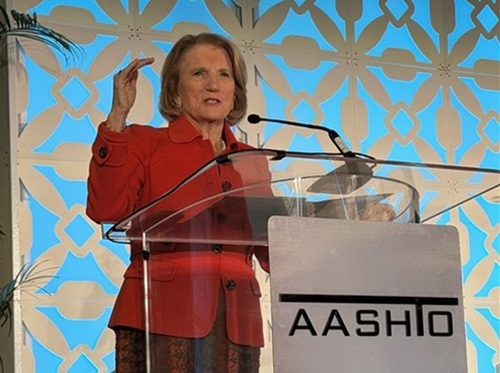The White House Council on Environmental Quality or CEQ recently finalized reforms to the National Environmental Policy Act or NEPA that implement permitting efficiencies laid out in the Fiscal Responsibility Act of 2023, including setting clear deadlines for agencies to complete environmental reviews, requiring a lead agency and setting specific expectations for lead and cooperating agencies, and creating a unified and coordinated federal review process.
[Above image via the White House]
The CEQ said the rule provides agencies with other new and faster tools to improve the efficiency and effectiveness of environmental reviews. For example, it creates new ways for federal agencies to establish categorical exclusions – the fastest form of environmental review.
The agency noted the new NEPA reforms will apply to projects beginning environmental reviews on or after July 1 this year, but will not disrupt ongoing environmental review processes.
The new NEPA reforms are intended to help accelerate reviews for projects that agencies can evaluate on a broad, programmatic scale, or that incorporate measures to mitigate adverse effects – helping the transportation industry and other sectors speed up environmental reviews and providing more certainty when they are designing projects.

Finally, the CEQ says the new rule promotes early public engagement in environmental review processes to help reduce conflict, accelerate project reviews, improve project design and outcomes, and increase legal durability, noted Brenda Mallory, CEQ’s chair, in a statement – helping accelerate permitting for everything from wildfire management and electric vehicle charging infrastructure to high-speed internet and semiconductor manufacturing.
“These reforms will deliver smarter decisions, quicker permitting, and projects that are built better and faster,” she noted. “As we accelerate our clean energy future, we are also protecting communities from pollution and environmental harms that can result from poor planning and decision making while making sure we build projects in the right places.”
The CEQ said it conducted a “robust review” of more than 148,000 public comments on the proposed rule, of which approximately 920 were unique comments.
The American Association of State Highway and Transportation Officials provided detailed feedback on CEQ’s then-proposed NEPA revisions in September 2023, noting in its comment letter that it “shares CEQ’s goals” of providing for efficient and effective environmental reviews, ensuring full and fair public involvement, providing regulatory certainty, promoting better decision-making grounded in science, and protecting the environment.

Key comments from AASHTO included that there should be no “one-size-fits-all” way to comply with NEPA. “Each transportation project is unique,” the group pointed out in its letter.
“Flexibility [is needed] to tailor the NEPA process based on a particular project’s circumstances [so] agencies should be able to meet NEPA’s requirements in a way that minimizes the financial and administrative burdens, informs public decisions, protects the environment, and avoids unintended consequences such as public or agency uncertainty and increased litigation risk,” the organization added.
AASHTO also said CEQ’s NEPA regulations should provide clear direction to agencies, project sponsors and applicants, and the public. “To improve agency and public understanding of the regulatory framework, CEQ should be clear about which aspects of the regulations are statutorily required,” the group emphasized.
“AASHTO is concerned that CEQ’s proposed regulations introduce new undefined terms and create new vague requirements, which will lead to delays in project delivery and increase litigation risk for projects,” the group said. “For example, in various areas throughout the regulations, CEQ proposes to replace the term ‘significant’ with the ambiguous and undefined terms ‘important’ or ‘substantial.’”
 Top Stories
Top Stories
Congressional Leaders Detail Key Transportation Priorities
February 27, 2026 Top Stories
Top Stories

